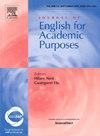Empowering learners to invest in imagined and EAP identities to claim as legitimate English users: A multiple-case study
IF 3.1
1区 文学
Q1 EDUCATION & EDUCATIONAL RESEARCH
引用次数: 0
Abstract
While identity has garnered increasing attention from English for Academic Purposes (EAP) scholars, relatively little research has investigated how identity can serve as a critical lens for exploring the ways in which EAP learners navigate complex power dynamics and engage with the discursive norms of distinct academic disciplines and professions. Recognizing that EAP learners negotiate multiple, intersecting identities within EAP contexts, this action research adopts the model of second language (L2) investment to examine how university students invest in their EAP identities that are intertwined with their social, cultural, and imagined identities and claim legitimacy as English users within their respective imagined communities. Drawing on triangulated data sources—including teaching materials, techno-reflective narrative interviews, and learner artifacts—this article presents findings from a multiple-case study of two Chinese EAP students in the discipline of politics. The study investigates how these two cases were empowered to envision their roles within their own sociocultural communities, develop proposals, and present posters addressing key global issues, thereby positioning themselves as legitimate contributors to society. The findings illustrate how the participants developed two distinct agendas—primary education in Africa and gender equity in education in China—through which they simultaneously performed imagined government official identities, disciplinary, authorial, and discoursal EAP identities, as well as their social and cultural identities. The article concludes by discussing pedagogical implications for EAP practitioners and outlining directions for future research.
授权学习者投资于想象和EAP身份,以声称自己是合法的英语用户:一个多案例研究
虽然身份已经引起了学术英语(EAP)学者越来越多的关注,但相对较少的研究调查了身份如何作为探索EAP学习者驾驭复杂权力动态和参与不同学科和专业话语规范的关键视角。认识到EAP学习者在EAP语境中协商多重交叉的身份,本行动研究采用第二语言(L2)投资模型来研究大学生如何投资他们的EAP身份,这些身份与他们的社会、文化和想象身份交织在一起,并在各自的想象社区中主张英语使用者的合法性。本文利用三角数据来源——包括教材、技术反射式叙事访谈和学习者工件——展示了对两名中国政治学科EAP学生的多案例研究结果。该研究调查了这两个案例如何被授权设想他们在自己的社会文化社区中的角色,制定建议,并提出解决关键全球问题的海报,从而将自己定位为社会的合法贡献者。研究结果说明了参与者如何发展出两个截然不同的议程——非洲的初等教育和中国的教育中的性别平等——通过这些议程,他们同时表现出想象中的政府官员身份、学科、作者和话语中的性别平等身份,以及他们的社会和文化身份。文章最后讨论了对EAP从业者的教学意义,并概述了未来研究的方向。
本文章由计算机程序翻译,如有差异,请以英文原文为准。
求助全文
约1分钟内获得全文
求助全文
来源期刊

Journal of English for Academic Purposes
Multiple-
CiteScore
6.60
自引率
13.30%
发文量
81
审稿时长
57 days
期刊介绍:
The Journal of English for Academic Purposes provides a forum for the dissemination of information and views which enables practitioners of and researchers in EAP to keep current with developments in their field and to contribute to its continued updating. JEAP publishes articles, book reviews, conference reports, and academic exchanges in the linguistic, sociolinguistic and psycholinguistic description of English as it occurs in the contexts of academic study and scholarly exchange itself.
 求助内容:
求助内容: 应助结果提醒方式:
应助结果提醒方式:


